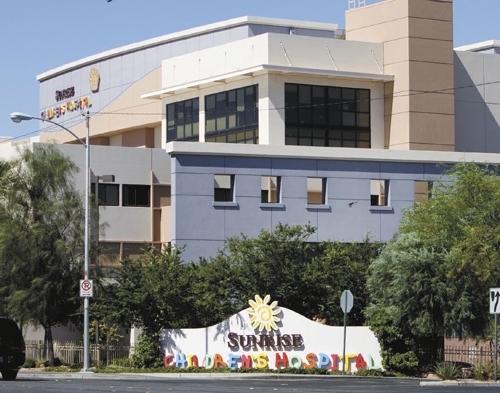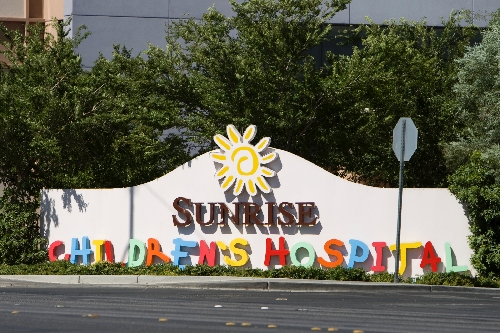Nurses targeted by police
Two Sunrise Children's Hospital nurses whose licenses were suspended because of disrupted catheters -- which left one newborn in critical condition -- are targets of a Las Vegas police investigation into "intentional patient harm," State Board of Nursing records reveal.
Another infant had to undergo an emergency procedure as a result of a catheter disruption, the hospital reported.
Registered nurses Jessica May Rice and Sharon Ochoa-Reyes were suspended by nursing board President Doreen Begley "in the interest of public health, safety and/or welfare" after the regulatory agency received notice on June 10 from law enforcement officials that each nurse was a "person of interest" in an "ongoing criminal investigation," according to documents obtained Tuesday under the Nevada public records law.
Rice received her Nevada nursing license in 2006, Ochoa-Reyes in 1991.
The nursing board documents reveal that while Rice and Ochoa-Reyes were employed at Sunrise in the Neonatal Intensive Care Unit, "a patient suffered physical harm" and "other patients were exposed to the potential for physical harm."
No details were given as to what kind of harm the newborn received or whether the unplanned operation of the other newborn was necessary to save the child's life.
When the child was critically injured and what steps have been taken to keep the child alive have not been revealed.
Sunrise officials disclosed Friday in their only statement on the matter that they had asked police to investigate 14 incidents of disrupted catheters in its intensive care unit for newborns going back to February.
Attempts to reach Rice and Ochoa-Reyes were unsuccessful.
On her page on the MySpace social networking website, Rice wrote about her job as a nurse at Sunrise: "I am also a very hard working RN that loves her jobs dearly. The babies that I spend time with bring me joy and happiness."
Her site says she is 32, graduated from Clark High School in Las Vegas and previously worked at Cincinnati Children's Hospital.
Amber Lopez Lasater, chief of staff for Service Employees International Union Local 1107, the union representing the nurses, said Tuesday: "We will issue a public statement once the police investigation is finished."
Las Vegas police Capt. Patrick Neville said late Monday that the criminal investigation was ongoing and weeks away from any conclusion.
District Attorney David Roger said it was too early to decide whether criminal charges should be filed. "It is very troubling, if true," Roger said.
Sunrise officials have not disclosed when they asked police to investigate the catheter disruptions, only that they did so after an umbilical catheter, which has a low failure rate, was somehow disrupted.
Sunrise officials said they initially thought the problems with catheter tubings, which are used to draw blood and deliver medications and nutrition, were technical in nature.
The nursing board documents show that Rice was suspended June 10, the same day the board learned she was a figure in a criminal probe, and that Ochoa-Reyes was suspended July 9, the same day Sunrise officials notified the public that they had "identified an issue with disrupted catheters ... in February of this year."
Katherine Ramsland, a criminologist at DeSales University in Pennsylvania who has long studied health care workers who run afoul of the law, said Sunrise officials now must study incidents and deaths in the neonatal unit "over many months and perhaps years."
Sunrise officials would not say how many infants had what medical officials term "unexpected outcomes" when Rice or Ochoa-Reyes was on duty in the neonatal unit.
Ramsland said nurses who do harm to patients are very good at covering up what they do. "Often they're not caught for years," she said.
Nurses who harm patients are known as "Angels of Death" because after they are caught they say they were putting patients out of their misery.
Ramsland said nurses who engage in mercy killing generally do so with those who are the most defenseless, either infants or the elderly.
She said it also is not unusual for an "Angel of Death" nurse to force a patient into a medical crisis so the nurse can be seen as heroic in saving the patient's life.
Ramsland said a former pediatric nurse in Texas, Genene Anne Jones, is the most infamous "Angel of Death." In 1985, she was sentenced to 99 years in a Texas prison for killing 15-month-old Chelsea McClellan with succinylcholine.
Authorities believe Jones killed between 11 and 46 infants and children in her care, using injections of drugs to force them into a medical crisis with the intention of reviving them to receive praise. Many children could not be revived, however.
Ramsland cautioned against jumping to conclusions in cases of unusual deaths and injuries in hospitals. She noted that with so many medications and technologies, death can occur in mysterious ways.
"You don't want to convict an innocent nurse," she said.
In 1980, Sunrise nurse Jani Adams was accused of killing a patient by reducing the flow of oxygen to his respirator. But a judge dismissed the case, ruling that the evidence did not prove that a crime had been committed.
The recent Sunrise case has caused groups and professionals who deal with childbirth to remind expectant parents to always ask questions about a hospital.
Mandie Medford, who owns HypnoBirthing Las Vegas, a specialized natural childbirth training program, said it is incumbent upon Sunrise and all other hospitals to be as transparent as possible about incidents that occur.
"If parents don't get the answers they need to questions about what is going on in the hospital, then they should go to another hospital," Medford said. "If you can't trust the people to tell you the truth about what's gone on and what they've done about it, then parents should be responsible and go somewhere else. There is no way you can be comfortable there."
Rachel VanHorn, who used the HypnoBirthing technique to give birth to her son, now 11 months old, said she has closely followed media reports about the Sunrise catheter incidents. VanHorn said she and her husband plan on expanding their family soon.
"If I was going to have a baby there, I would definitely want to know what happened and what they did about it," she said. "If the information is not given freely, I'm not inclined to go there."
VanHorn, a biologist, said she reads every medical report she can get about a hospital's outcomes.
"I think I have a responsibility as a parent to get as much data as I can," she said.
Dr. Richard Chudacoff, an obstetrician-gynecologist, said he always tells his patients during pregnancy to take tours of hospitals and ask "enough questions to make you comfortable."
And, he said, expectant families should frequently talk to doctors about their experiences at hospitals.
Sherry Hopkins, who runs Well Rounded Mama, a resource center for expectant families, said she wishes hospitals and medical practitioners would give people more insight into what goes on in health care so that they can make intelligent choices.
"But everybody is afraid of malpractice," she said. "Everybody is afraid of getting sued, so we don't end up knowing very much. That's the biggest problem I see in health care."
Review-Journal reporter Brian Haynes contributed to this story. Contact Paul Harasim at pharasim@reviewjournal.com or 702-387-2908.























